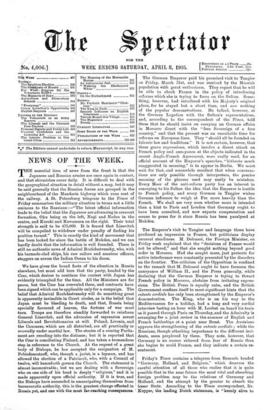The German Emperor paid his promised visit to Tangier on
Friday, March 31st, and was received by the Moorish populatien with great enthusiasm. They expect that he will be able to check France in the policy of introducing reforms which she is trying to force on the Sultan. Some- thing, however, had interfered with his Majesty's original plans, for he stayed but a short time, and saw nothing of the popular demonstrations. He talked, however, at the German Legation with the Sultan's representatives, and, according to . the correspondent of the Times, told them that he should insist on carrying on German affairs in Morocco' direct with the "free Sovereign of a free country," and that the present was an unsuitable time for reforms on European lines. They "should all be founded on Islamic law and traditions." It is not certain, however, that these grave expressions, which involve a direct attack on French policy and annoyance at the objects indicated in the recent Anglo-French'- Agreement, were really used, for an official account of the Emperor's speeches, "hitherto much exaggerated in meaning," is to appear in Berlin. We must wait for that, and meanwhile recollect that when conversa- tions are only possible through interpreters, the precise meaning of the phrases used may easily be mistaken. Every Moor of the anti-reform party has an interest in conveying to his Sultan the idea that the Emperor is hostile to French policy, and every German in Tangier wishes German influence to weigh at Fez more heavily than the French. We shall see very soon whether more is intended than a hint to Paris and London that Germany ought to have been consulted, and now expects compensation and means to press for it since Russia has been paralysed at Mukden.










































